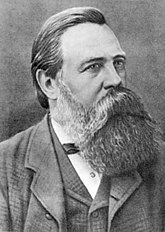Friedrich Engels
 From RationalWiki - Reading time: 2 min
From RationalWiki - Reading time: 2 min

| Join the party! Communism |
| Opiates for the masses |
| From each |
| To each |
Friedrich Engels (1820-1895), a prominent Prussian-born communist philosopher and British industrialist, co-wrote (with Karl Marx) the Communist Manifesto, and used the profits from his Manchester textile mill to provide Marx with financial support during the writing of Das Kapital. Engels died in 1895 from throat cancer in London at the age of 74.[1]
Despite his importance in the development of Marxism, Engels is significantly less cited than his writing partner. Some people would account for this by claiming that he did the impossible and managed to be more boring than Marx;[citation needed] his The Condition of the Working Class in England (1845), which Engels wrote based on his experience in the course of running his mill,[citation needed] is sometimes cited as being even more boring[citation needed] than Das Kapital.
His Origin of the Family, Private Property, and the State (1884) had a large influence on the development of Marxist class theory and of historical determinism. Ironically, it drew mostly from Ancient Society (1877) by Lewis Henry Morgan,![]() an American capitalist railroad tycoon and Republican politician.[note 1]
an American capitalist railroad tycoon and Republican politician.[note 1]
His Principles of Communism give a brief but concise explanation of communism, its essential ideas/theories, its basic policies, and an analysis of capitalism compared to previous economic systems.
See also[edit]
External links[edit]
- Works of Friedrich Engels in German and English on Wikisource
- "Engels vs. Marx?: Two Hundred Years of Frederick Engels", Monthly Review

Notes[edit]
- ↑ And feminist. And anti-Native. (No, really, politics were weird in the Gilded Age.)
 KSF
KSF